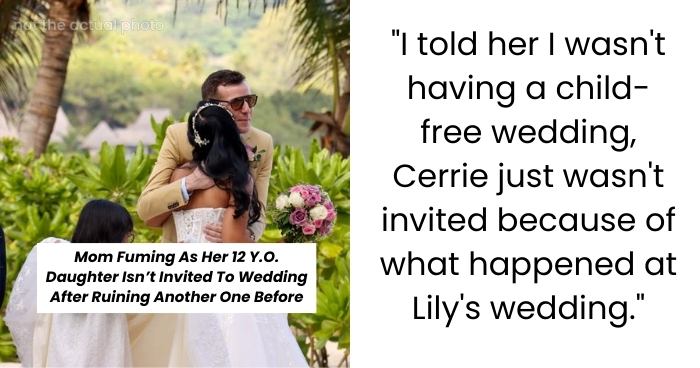Mom Fuming As Her 12 Y.O. Daughter Isn’t Invited To Wedding After Ruining Another One Before
The original poster (OP, 27m) and his fiancé (25f) are preparing for their fall wedding and have opted to allow children to attend—with one exception. Linda, OP’s cousin, is not allowed to bring her daughter Cerrie (12). This decision stems from an incident at another family wedding where Cerrie ruined the event by throwing a tantrum and destroying the wedding cake because she wasn’t the flower girl. OP and his fiancé fear a repeat of this behavior and want to avoid any disruptions at their wedding.
When Linda received the invitation, which made it clear Cerrie was not invited, she confronted OP. She criticized child-free weddings, seemingly missing the fact that OP’s event allows children—just not Cerrie. After OP explained the reasoning behind his decision, Linda rallied friends and sympathetic family members to bombard OP and his fiancé with texts, accusing them of selfishness for singling out Cerrie. OP notes that excluding Linda entirely would have caused even greater family drama due to their family’s emphasis on “family first” and respecting elders.
Read for more info Reddit
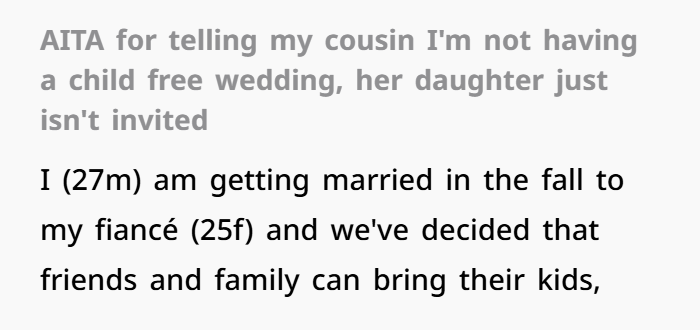
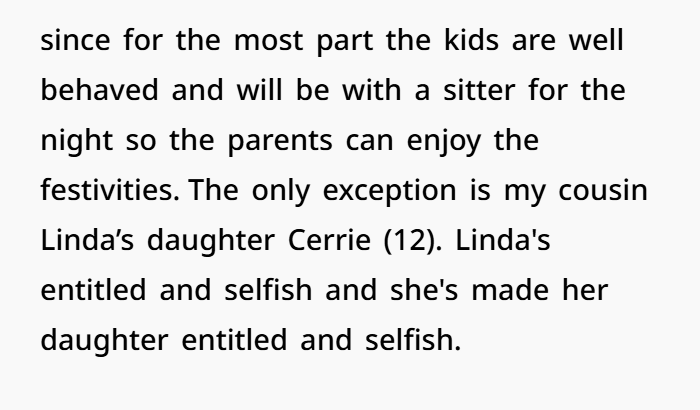
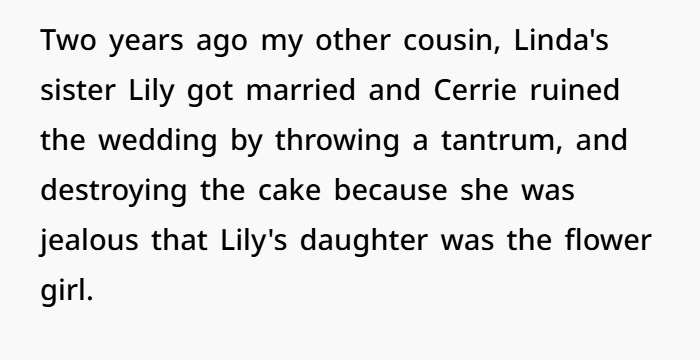
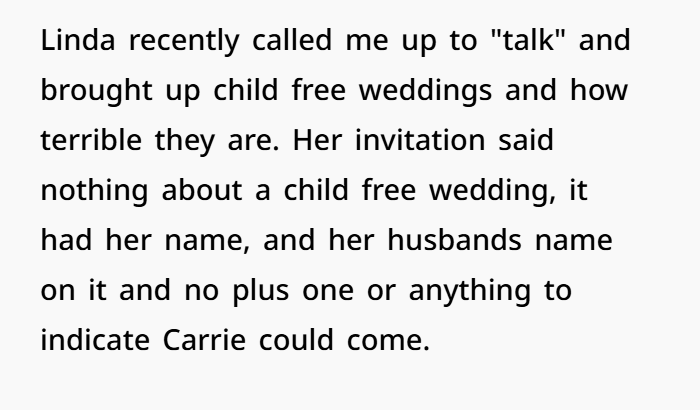


The problem is that this woman’s 12 Y.O. daughter is really spoiled, according to the author, and ruined her aunt’s wedding two years ago

1. Balancing Family Expectations vs. Individual Boundaries OP’s decision highlights a common tension in family dynamics: balancing respect for familial norms with the need to enforce personal boundaries. Sociological studies on family relationships underscore that when families prioritize unity (“family first”), it often comes at the expense of individual members who must make sacrifices to keep the peace. By inviting Linda but excluding Cerrie, OP is trying to navigate this tricky balance.
2. Legal and Etiquette Considerations From an etiquette standpoint, wedding invitations are considered binding statements of intent. Emily Post’s wedding etiquette advises that guests should not make assumptions about who is invited—if Cerrie’s name wasn’t on the invitation, she isn’t welcome. This helps OP’s case; however, Linda’s interpretation of the invite indicates a deeper issue of entitlement.
3. Examples of Precedents Similar family wedding conflicts frequently arise on platforms like Reddit. A recurring theme is that family members often use emotional manipulation to get their way, as Linda is doing by rallying others to apply pressure. In a well-documented case shared on “Dear Prudence,” a family allowed an uninvited child to attend, resulting in property damage and strained relationships that lasted years. These stories emphasize the importance of standing firm on boundaries.
4. Parenting Styles and Behavioral Red Flags Linda’s parenting may have contributed to Cerrie’s disruptive behavior. According to psychologists like Diana Baumrind, permissive parenting can result in children developing a sense of entitlement and an inability to handle disappointment. Cerrie’s actions at the previous wedding and Linda’s dismissal of the consequences align with this pattern. By enforcing a boundary now, OP is protecting his wedding and setting a precedent for accountability.
However, most of the commenters sided with the groom-to-be, although some of them admitted it’s a ‘justified jerk move’ on his part

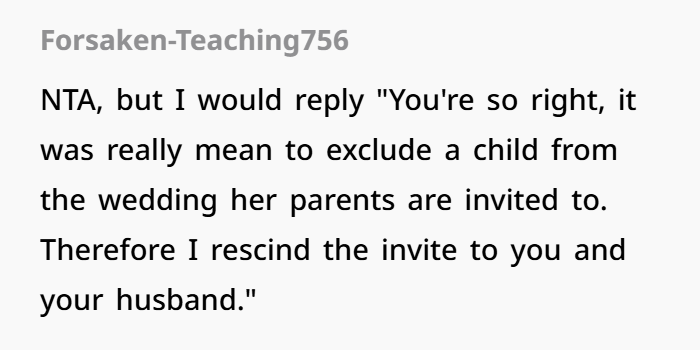


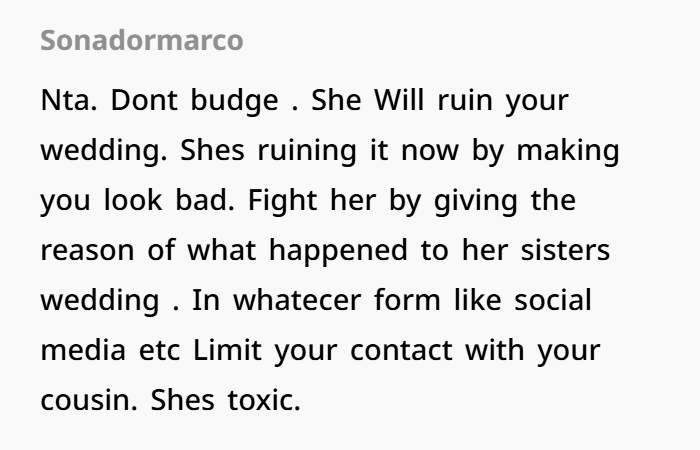
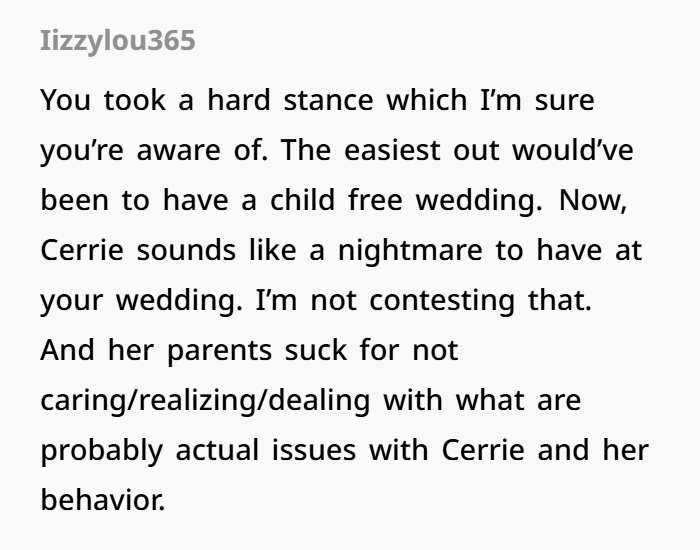

OP seems justified in his decision to exclude Cerrie while inviting other children. Given her history of disruptive behavior and Linda’s dismissive attitude, this boundary appears reasonable to ensure the wedding goes smoothly. While family backlash is unavoidable in situations like this, standing firm may ultimately earn OP the respect of other relatives who recognize the importance of maintaining boundaries. In the end, Linda’s reaction underscores why OP’s decision was necessary.

